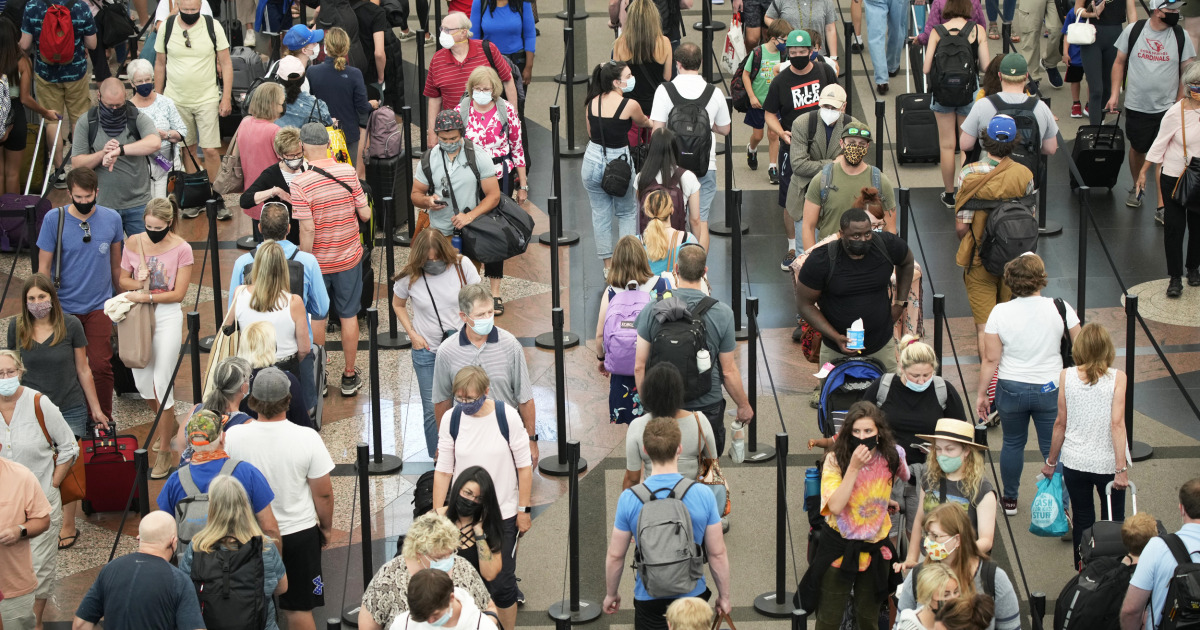
A worker shortage at Dallas/Fort Worth International Airport became so severe last month that one of its top executives sent a message to shops and restaurants: Don’t steal each other’s employees.
“As you know, we are experiencing one of the greatest hiring challenges in the history of DFW Airport,” Ken Buchanan, executive vice president of revenue management and customer experience, wrote to concessionaires in a May 27 letter reviewed by CNBC. “As we prepare for a busy summer, please continue to practice DFW Airport’s high standards of hiring operations and refrain from soliciting employees from other DFW operations (‘poaching’).”
After more than a year of coronavirus pandemic lockdowns, travelers busting out of their homes for vacation have been met with long security lines, hourslong hold times with airlines and fewer options at the airport for everything from coffee to fried chicken sandwiches because of understaffing.
Workers must be willing to undergo a federal security check, which can take more than two weeks, and trek out to the airport to flip burgers or sell magazines.
The Transportation Security Administration is offering $1,000 hiring bonuses as part of its push to add 6,000 screeners by the end of September. So far it has hired about 4,000, a TSA spokeswoman said. Airports serving Austin, Texas; Myrtle Beach, South Carolina; and Charlotte, North Carolina, have told travelers to arrive as much as three hours early in recent weeks because of long security lines.
Some airlines, which received $54 billion in federal payroll aid to keep them from laying off workers, are now racing to hire people to staff reservation phone lines and other parts of the business. Carriers urged employees to take temporary leaves or buyouts during the pandemic to cut costs. American recently trimmed its schedule by 1 percent for the first half of July, citing a staffing shortage.
U.S. leisure and hospitality jobs increased by 292,000 last month, accounting for more than half of May’s employment gains, according to the Labor Department’s monthly report. Almost two-thirds of the sectors’ employment gains came from food service and drinking establishments.
The national trend that has challenged managers trying to fill these types jobs is even more acute at many airports.
Potential workers who are willing to undergo a federal security check, which can take more than two weeks, and trek out to the airport to flip burgers or sell magazines are coming at a premium — if they can be found at all.
“Airports, even in normal times, have tremendous difficulty getting people to want to come to the airport to work,” said Earl Heffintrayer, senior airport analyst at Moody’s Investors Service.
The strong recovery after spending a year of grappling with a plunge in demand has created a scramble for workers.
Employers “cut a lot [of jobs last year] and all of a sudden they want to hire a lot. A lot of employers are trying to hire at the same time,” said Ioana Marinescu, an assistant professor of public policy at the University of Pennsylvania who has studied the impact of stimulus checks during the pandemic. “The pool of workers is roughly constant, while the number of employers trying to hire is going up and up and up.”
TSA airport screenings have rebounded to about 80 percent of 2019 levels, a sharp turnaround from last year when passenger volume in the U.S. dropped to the lowest levels since 1984 — and $20 billion in federal aid for airports has softened the blow of worker shortages, Moody’s Heffintrayer said. That includes $8 billion in airport grants the Federal Aviation Administration announced last week — $800 million of which was set aside for rent relief for airport retailers and food and beverage operators.
Airports Council International estimates U.S. airports’ lost revenue will total $40 billion through March 2022 because of the pandemic.
“There’s definitely money being left on the table,” Heffintrayer said of the effect of airports’ worker shortfall. Terminal food and beverage concessions and retail stores contributed about 7 percent to U.S. commercial airports’ nearly $25 billion in 2019 operating revenue.
Gilbert Aranza, CEO of Star Concessions, which operates or jointly runs more than 50 food, beverage and retail businesses at DFW and Dallas Love Field, said he wants the airport to add rules against employee poaching in leases. He said the idea was inspired by the NFL’s anti-tampering rules, which prohibit rival teams from courting a player who is under contract with another club.
Star Concessions is operating several eateries and concessions at a new string of four gates at DFW, but said it has been unable to staff sufficiently. One senior manager said he was bringing food from the kitchen to customers. A cook at one of his other restaurants, who declined to give her name, said she was approached by a manager at another eatery asking if she would join for $1 an hour more, or $16. Aranza’s restaurant matched the proposed increase.
In late May, Star Concessions held a job fair at a nearby airport hotel, staffed by four of its employees. Nine candidates showed up. The company is offering $400 referral bonuses to current employees and $200 bonuses to staff who work 35 hours or more a week, said Mollie Standridge, Star Concessions vice president.
Companies will often turn to bonuses over wage increases. Once “you raise wages it’s harder to bring them back down,” said Marinescu. But some employers are raising wages to attract workers.
Star Concessions has raised hourly wages for nontipped employees in its concessions to $14 to $17 an hour from $12 to $14, Standridge said.
OTG Management, which operates airport terminal restaurants in Newark, New Jersey, Houston and other major hubs, is offering $750 signing bonuses, said CEO Rick Blatstein. Cooks are in the greatest demand and get $1,000 signing bonuses, while new managers get $3,000 bonuses.
The company, which like other concessionaires, laid workers off early in the pandemic, was still short about 1,000 employees earlier this month. It’s not stopping locations from opening but OTG is forced to limit menu items, Blatstein said.
“After hiring 75 people, just 34 showed up on their first day.”
Star Concessions contracted 75 people, who were badged by the airport; 34 showed up on their first day, said Standridge.
A shortfall of workers can mean longer waits for food, time passengers often don’t have.
Customers generally take “15 minutes from butt-in-seat to butt up” in airport bars and up to about 22 minutes in restaurants, she said. Travelers aren’t coming to the airport “to eat at Maggiano’s,” referring to the Italian American restaurant chain, Standridge said.
The problem isn’t limited to DFW.
“We’re treading water,” said Les Gunderson, chief operating officer and more than two-decade employee of the Montana Gift Corral, which operates 11 gift shops and four restaurants in Bozeman, Montana, and Bozeman Yellowstone International Airport, selling everything from paintings to thermos holders to bear claw-shaped salad servers.
Gunderson said the company started sending out flyers to nearby towns, advertising $2,000 bonuses for workers. It’s short employees after many college students left town during the pandemic.
“We’re hiring more high school students than we ever did,” she said.
Source: | This article originally belongs to Nbcnews.com










